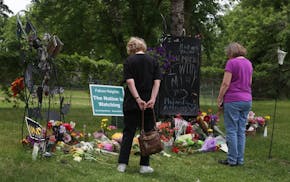In a unanimous decision this morning, the U.S. Supreme Court just overturned recess appointments made by President Obama in 2012 to the National Labor Relations Board. The big question now: Will the cases decided by the NLRB during the period in question also be invalidated?
It surfaced right away on the SCOTUS live blog as the decision came down: "In terms of these recess appointments of members of the NLRB, they were invalid. That means that their rulings were invalid. It is unclear what will happen with other NLRB rulings from that period," according to one contributor.
There's a timely opportunity for a member of the Minnesota media to get his 15 seconds on the nightly news by asking President Obama on his Twin Cities trip today.
A year ago I wrote a story on the almost 2 dozen Minnesota labor disputes decided by the NLRB that hang in the balance. While we wait to hear how their jobs, lives and families will be affected by the unconstitutional action struck down today, you can get a glimpse of the personal impact of this Washington power struggle on real Minnesotans in my previous post--NLRB Keeps Minnesota Workers and Companies on Hold Until SCOTUS Decision.
Here's some of what I wrote:
The list of cases from published and unpublished decisions on the NLRB's website finds pockets of Minnesota companies and employees involved in union issues across the state. Those affected include a Brooklyn Park auto service, a Northfield urgent care center, emergency dispatchers in Dodge County, public employees in Cass County and an Excelsior nursing facility.
The NLRB decisions were among hundreds made after January 9, 2012, by board members who were "recess appointees" selected by Obama but never confirmed by the Senate. A federal appeals court found the appointees to be invalid earlier this year, potentially nullifying NLRB decisions, depending on the U.S. Supreme Court's decision on the president's recess-appointment powers in Noel Canning v. NLRB in its next term.
The impact of that case will reverberate far beyond the cases left hanging before one of Washington's most politicized institutions.
"These are overwhelming constitutional issues," said John Raudabaugh, a former NLRB board member and Ave Maria School of Law professor. "The Noel Canning case will undoubtedly be one of the most significant decisions in Supreme Court history. There's no doubt about it."
The details of the Minnesota cases on record offer a revealing behind-the-scenes view of how labor relations play out on a daily basis in the public and private sectors. Several filings involve the outcome of elections over whether to establish a collective bargaining unit, while another involves a worker who challenged the union's failure to inform him of his right to withhold dues for political activity. Another issue involved a quirky attempt by canvass workers to unionize the Sisters' Camelot, a Minneapolis collective.
For Vision of Elk River and five former employees who were terminated by the suburban school bus company, it's just the latest twist in a saga that dates back four years in the system, longer in the workplace. It's getting old for one 70-year-old former worker who lost her job in 2009.
"Anything that would get a settlement and get this taken care of, I'm for," said Sharron Lynas. "How can they do that? Forever and ever they're going to put everything on hold until we all croak? I don't know what's going on. I really don't."
The former workers claim they were terminated for supporting a union, an allegation denied by management. An administrative law judge dismissed the workers' case, but upon appeal the NLRB reversed that finding and ruled in favor of the former employees in September 2012. Fast forward almost a year and the case is in legal limbo.
Now what? That's what the workers and companies unnecessarily caught up in power politics may be about to find out. Here's a list of the Minnesota cases affected by the ruling.

Jury selected for Feeding Our Future trial after unusually long process due to publicity of massive fraud case
Man gets more than 21 years for part in fatal crash during rolling shootout in downtown Minneapolis

Former MnDOT official approved as Minneapolis public works director

